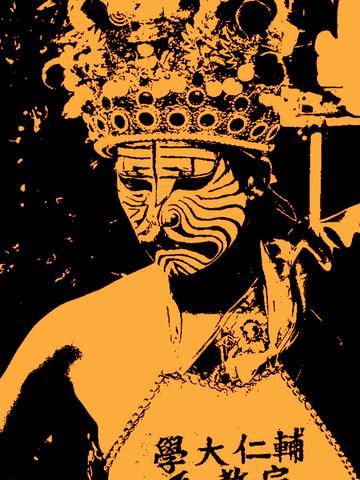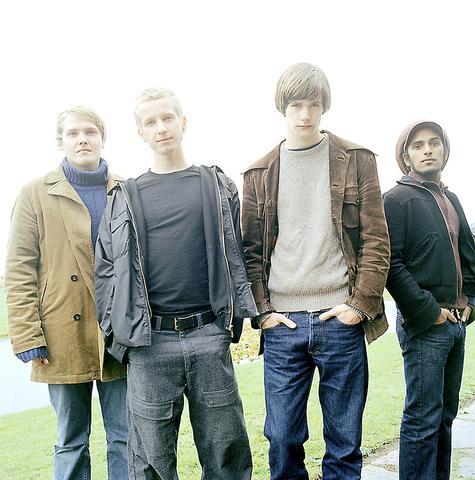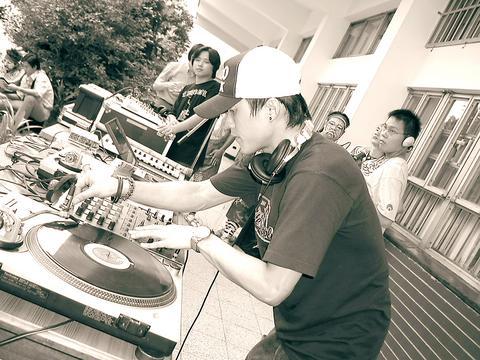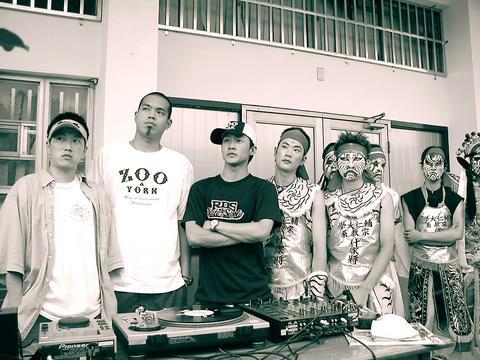Break out the speedos and sarongs and the 50spf sunscreen because it's time yet again to join the sweaty, heaving crowds at the Gungliao Ho-Hai-Yan Rock Festival for a weekend of music and sand in your beer.
Attracting thousands each year with the tried-and-true formula of sun, sea and music, the festival this time around looks set to out do its three previous incarnations with a three-day lineup that includes some of Taiwan's biggest bands and for the first time several big-name groups from abroad.

PHOTO: WAX WOODWORTH, TAIPEI TIMES
The festival starts this evening on the white-sand beach at Fulong, a two-hour hop from downtown Taipei by train, and should keep people's ears ringing until late Sunday night.

PHOTO: WAX WOODWORTH, TAIPEI TIMES
For the past three years Ho-Hai-Yan has been a rite of passage event for up-and-coming bands, much as the annual Spring Scream has been, with a battle of the bands being held under the banner of the Taiwan Indie Music Awards. The winners of the awards walk away with NT$200,000 -- no small sum for amateur bands facing the likelihood of having to record and release albums without the support of a record label.
Along with the Indie Music Awards, the festival has also served as an annual pow-wow for the indie music scene. Taiwan Colors Music (TCM), the country's most prominent independent record label which has co-organized the festival with the Taipei County Government since its inception, lends the event considerable street cred and has consistently brought together the best under-appreciated music talents for this free concert on the beach.

PHOTO: WAX WOODWORTH, TAIPEI TIMES
"The Taipei County Government turned to us because they didn't know anything about the music scene. We had the contacts and experience to do it right," said Zhang 43 (張43), head of TCM.

PHOTO: WAX WOODWORTH, TAIPEI TIMES
This year TCM was put in charge of today's and tomorrow's lineups while the Taipei City Government, looking to expand the festival to a third day and bring in talent from overseas, called on MTV for its international contacts.
"Even though MTV organized the third day, the festival is still an indie event," Zhang said.
Two stages have been set up -- a small one for a dense schedule of underground bands and an enormous stage on the waterfront for the main acts.
Today's roster on the main stage includes punk, rock and folk bands, as well as a special performance by three DJs and students from the religion department of Fujen Catholic University. The piece is the brainchild of Zhang from TCM, who is the mind behind a long list of oddball concept albums and projects produced by his label.
The students will be putting on a show of the traditional Eight Generals (
elements of local culture that draw disapproving glances from the more bourgeois sectors of Taiwan's cultural establishment and this performance is another feather in his cap.
Huang Yi-chin (黃一晉) of downtempo group 78Bpm, drum n' bass DJ Ty and hip hop DJ J4 have arranged tunes to which the students, in full face paint and costume, go through the slow ritual dances and ceremonial gestures of the Eight Generals performance.
"It's something that's never been done before, but the mix [of traditional performance and modern music] comes off quite well," DJ Ty said at a rehearsal on Tuesday.
Closing out tonight's show will be Panai, an Aboriginal diva whose heart-breaking songs of a life of hardship have earned her praise as one of the best voices in Taiwan.
Tomorrow 11 bands will duke it out on the main stage for the Indie Music Awards. Bands such as Rubinton (路邊攤), Relax One (輕鬆玩) and Monkey Insane (潑猴) have been around for some time, while the group that has raised a lot of anticipation and stirred the most controversy is the high school girl punk trio Hotpink.
In the nitpicky, back-stabbing world of local Internet chatrooms Hotpink have been thrashed as "gimmicky" and "token finalists" because of their gender and age. Conversely, when organizers announced the finalists, they singled out Hotpink as a band to watch at the competition.
Last year's winners, Tizzy Bac, a cutesy pop-rock ensemble that could have been spawned of a union between Belle and Sebastien and St. Etienne, will end the day of music before the winners of the NT$200,000 award are announced.
The heavy hitters of the festival will play on Sunday. Starting things off will be Magic Tribe (夢幻部落), an Atayal Aboriginal rock band from Wulai, Taipei County, followed by the fusion rock-jazz of the Junk Band from Hong Kong and Macau. As the sun goes down local stars Sticky Rice (糯米糰) should get everyone in the groove with their quirky funk and sing-along rock tunes before the festival's headliners the Perishers and Jaurim hit the stage.
The Perishers are one of a handful of new bands from Sweden, which has recently become cool again since the country unleashed bands like the Hives in the wake of the new rock explosion triggered by the Strokes. Though pulled from the second string of major international acts, their peppy sound, reminiscent of Coldplay or Oasis, should prompt some vigorous lighter and glow-stick swaying.
For the real mosh pit action, though, people will have to wait for Jaurim, Korea's hardest-hitting rock act, to wrap up the festival in style. Unlike in previous years, concert-goers will be permitted to pitch tents on the Fulong Beach Park grounds for the duration of the festival. And as long as a typhoon doesn't blow around off the coast like it did last year during the festiva,l prompting the police to rope off the water, revelers will be allowed to cool off by swimming in the ocean, which is one of the main draws of the event in the first place.

Taiwan has next to no political engagement in Myanmar, either with the ruling military junta nor the dozens of armed groups who’ve in the last five years taken over around two-thirds of the nation’s territory in a sprawling, patchwork civil war. But early last month, the leader of one relatively minor Burmese revolutionary faction, General Nerdah Bomya, who is also an alleged war criminal, made a low key visit to Taipei, where he met with a member of President William Lai’s (賴清德) staff, a retired Taiwanese military official and several academics. “I feel like Taiwan is a good example of

March 2 to March 8 Gunfire rang out along the shore of the frontline island of Lieyu (烈嶼) on a foggy afternoon on March 7, 1987. By the time it was over, about 20 unarmed Vietnamese refugees — men, women, elderly and children — were dead. They were hastily buried, followed by decades of silence. Months later, opposition politicians and journalists tried to uncover what had happened, but conflicting accounts only deepened the confusion. One version suggested that government troops had mistakenly killed their own operatives attempting to return home from Vietnam. The military maintained that the

Before the last section of the round-the-island railway was electrified, one old blue train still chugged back and forth between Pingtung County’s Fangliao (枋寮) and Taitung (台東) stations once a day. It was so slow, was so hot (it had no air conditioning) and covered such a short distance, that the low fare still failed to attract many riders. This relic of the past was finally retired when the South Link Line was fully electrified on Dec. 23, 2020. A wave of nostalgia surrounded the termination of the Ordinary Train service, as these train carriages had been in use for decades

Lori Sepich smoked for years and sometimes skipped taking her blood pressure medicine. But she never thought she’d have a heart attack. The possibility “just wasn’t registering with me,” said the 64-year-old from Memphis, Tennessee, who suffered two of them 13 years apart. She’s far from alone. More than 60 million women in the US live with cardiovascular disease, which includes heart disease as well as stroke, heart failure and atrial fibrillation. And despite the myth that heart attacks mostly strike men, women are vulnerable too. Overall in the US, 1 in 5 women dies of cardiovascular disease each year, 37,000 of them